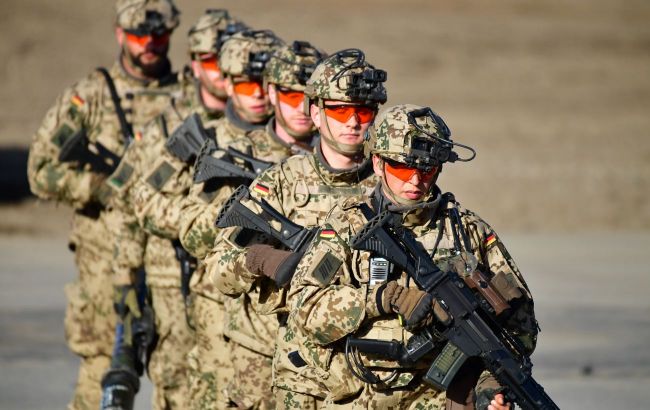Germany says 'nein': 59% unwilling to defend homeland in case of war
 German army (photo: Getty Images)
German army (photo: Getty Images)
Nearly two-thirds of German citizens are not willing to take up arms to defend their country in the event of an attack. These are the findings of a new public opinion survey commissioned by German broadcaster RND, as reported by The Telegraph.
What the survey showed
59% of respondents stated that they would "probably" or "definitely" not defend Germany in the event of an armed invasion. Only 16% said they were "definitely" ready to take up arms, while another 22% said they would "probably" defend the country.
These results present a serious challenge for Defense Minister Boris Pistorius, who is leading the rearmament program of the Bundeswehr amid decades of underfunding of the German army.
A new course toward militarization
In July, Pistorius presented a recruitment plan for the Bundeswehr — by 2031, the army is to be reinforced with 40,000 young citizens annually.
As part of this reform, it is planned to make questionnaire completion mandatory for men upon reaching the age of 18, and medical examinations may be introduced to assess fitness for service.
According to military officials, the number of armed forces personnel is expected to increase from 182,000 to at least 260,000 by 2035. The number of reservists is to grow from 60,000 to 200,000.
The German army has faced recruitment difficulties for years. This is partly explained by the historical sense of guilt after World War II and the belief among some Germans that the country does not need armed forces. Conscription was abolished in 2011 due to its unpopularity among the population.
Russia's invasion of Ukraine changed the government's position
After Russia's full-scale invasion of Ukraine in 2022, Berlin began to reassess its approach to security. This new course was called Zeitenwende — a turning point in history.
Chancellor Friedrich Merz, who won the elections in February, stated that Germany is back and pledged to confront the aggression of Russian President Vladimir Putin.
Billions for defense and infrastructure
The new government has introduced historic funding reforms: defense projects exceeding 1% of GDP can receive unlimited financing. A special infrastructure fund of €500 billion was also created to modernize roads and railways.
This is part of a broader NATO strategy in the event of war with Russia — Germany is to become a key transit hub for the movement of equipment and troops to the eastern front.
Similar problems in other countries
Recruitment issues are not exclusive to Germany. In Italy, only 16% of citizens are willing to defend their country, despite a 46% increase in the defense budget over the past 10 years.
In the United Kingdom, the army and navy have failed to meet annual recruitment targets almost every year since 2010. The reasons include low pay, poor living conditions, and declining interest in military service among the youth.
Earlier, RBC-Ukraine reported that most Poles fear for the existence of their state: 63% are concerned about a possible attack. According to an IBRiS survey, more than one-third of Poles would plan to flee abroad or to safer regions in the event of war, while the willingness to fight has decreased compared to last year. Social trust among people has also declined. Anxiety levels have risen since the start of Russia's invasion of Ukraine.
Germany is preparing for a potential large-scale conflict in Europe in the next 4 to 7 years due to the threat of a Russian attack on NATO. The country plans to teach schoolchildren civil defense, survival, and first aid, and the government is advising families to prepare supplies and emergency backpacks.

